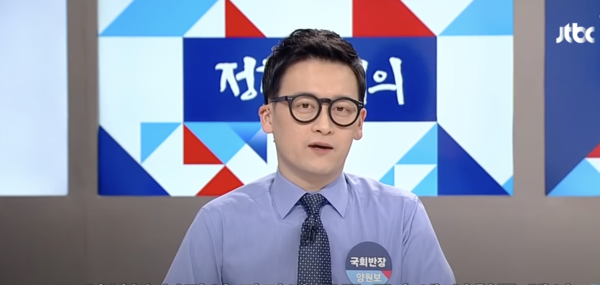
Chief Producer (CP), reporter, and news anchor at JTBC, Yang Won-bo, an alumnus of Hanyang University (HYU) has been receiving significant public attention for his contributions to modern journalism. He established a distinctive position for himself across various media platforms, earning a reputation akin to Korea’s Batman for his exposés on crimes that impact ordinary citizens. The Hanyang Journal (HJ) had the privilege of interviewing Yang Won-bo to gain a glimpse into his professional trajectory that spans almost two decades, as well as the personal experiences that shaped his unique approach to journalism.
# Yang Won-bo at a glance
Q. As the CP of JTBC’s Mobile Contents Team, what prompted the shift in your career, from ‘traditional’ journalism to digital content production?
A. I began my career as a journalist at Segye Ilbo and later moved to JoongAng Ilbo. However, my career path took an unexpected turn when I ended up becoming a broadcasting journalist while working for JTBC. The media industry is currently undergoing rapid changes, and traditional media is struggling to stay afloat. In my opinion, the key to survive in this industry, particularly in news and broadcasting, is the ability to adapt to digitalization.
Q. What do you think is the main element in mobile content creation? How does it differ from a conventional approach to journalism?
A. The main element of mobile content production lies in communication. It is exhilarating to realize that my demands and voice are reflected in the reporting! The most important aspect is creating a sense of connection with others. Connection leads to loyalty, a sense of solidarity, and the formation of empathy. In the past, content creation was mostly centered on the producers’ views. But in the digital era, it needs to shift towards being consumer-centric.
Q. Could you share the toughest moment you have faced during your journalism career and how you overcame it?
A. I started as a news reporter, thinking it would be my lifelong career. However, my time as a commentator for JTBC, an affiliate of JoongAng Ilbo, was the turning point. This led me to become a broadcasting journalist, a role that differs greatly from news reporting in both working style and thought process. While news reporting focuses on investigative skills and writing, broadcast reporting demands on-air talent and a producer’s mindset. Developing these attributes was a challenge.

# “Scandal Supervisor” and “Problem Mediator, Yang Won-bo”
Since 2020, Yang Won-bo has been the anchor of the current affairs YouTube channel, “Scandal Supervisor.” His direct and refreshing storytelling approach has not only transformed the channel’s image but also played a significant role in its spike in popularity.
Q. Was there a special reason that led you to join the ‘Scandal Supervisor’ channel?
A. Previously, I appeared on a program called Political Journalists’ Meeting. Since then, my broadcasting principle has been ‘If it is not entertaining, it is not considered TV.’ I believed that this should also apply to the news. By incorporating elements of entertainment, I thought that the audience would better understand and enjoy the content without feeling overwhelmed. After being a political reporter up to this point, Son Suk-hee, the news director back then, selected me as the host of ‘Scandal Supervisor.’ The rest is history.

Q. Among the various cases that you covered on ‘Scandal Supervisor,’ which left the greatest impression?
A. Many cases come to mind. ‘Scandal Supervisor’ is produced based on tips from citizens and this distinguishes it from other programs. Recently, there was a shocking sexual assault case involving a middle school student in Nonsan, Chungcheongnam-do. A friend of the victim emailed us saying, ‘How can such an incident not make a single line in the news?’ I spoke with the victim, who was taken to an elementary school playground at dawn and was subjected to all kinds of sexual abuse. It was so shocking that I thought it was a lie at first. Eventually, the perpetrator was arrested and received a fairly severe sentence for a juvenile offender. If you read the news section on the portal, you will often see the phrase ‘According to Scandal Supervisor on JTBC….’ As such, we broadcast numerous exclusive stories to the world, and there are too many to list individually.
Q. Given the support for your recently launched YouTube channel, ‘Problem Mediator Yang Won-bo,’ where you reveal criminals’ identities, do you believe the laws protecting the perpetrators’ identities are inadequate?
A. South Korea is going against the global trend, hastily emphasizing the protection of the rights of perpetrators rather than those of the victims. Consequently, the victims’ families often resort to extreme measures, such as publicly sharing the faces of their deceased loved ones and sometimes even choosing to resort to self-harm.
A remnant of the nightmares from our past authoritarian regime, this is the result of Korea’s overly extensive interpretation of human rights. Even countries that have a longer history of struggle for human rights and national conflicts do not go to these extremes. Through ‘Scandal Supervisor,’ I advocate for a world where disclosing the identities of criminals is not considered controversial.
Q. You are pioneering a new era of journalism through YouTube and short-form content. Do you believe that journalism has developed new functions or roles through digital platforms?
A. In the past, during supplier-dominant times, the audience unquestioningly accepted what was on the news. However, with the diversification of platforms and the rise of individual YouTubers who exert considerable influence, a varied range of interests are represented.
Nowadays, even traditional media is quick to cover stories from ordinary citizens in online communities. I believe that digitization played a crucial role in shifting the market from supplier-centric to consumer-centric.
Q. ‘Problem Mediator Yang Won-bo’ frequently addresses socially sensitive issues. Could you share the principles or guidelines that you have for selecting content to broadcast?
A. The ‘Problem Mediator Yang Won-bo’ brand is a channel that launched separately from ‘Scandal Supervisor,’ which has to adhere to Broadcasting Deliberation Regulations. The aim is to adopt a two-pronged approach. The channel is created to handle a multitude of citizen reports that may be too sensitive for traditional broadcast standards or too niche to feature on mainstream programs. Additionally, it is designed to encourage audience participation by providing a platform for collective problem-solving in the comments, without the anchor drawing conclusions.
Q. Is there a type of case or field that you are particularly interested in? Could you please share what it is and why?
A. Lately, I have been focused on highlighting cases of sexual abuse within families, particularly those that are now unprosecutable due to the expiration of the statute of limitations. My goal is to condemn sexual crimes that occur when women’s rights are not respected, using broadcasting as my medium.

# Personal Insights of Yang Won-bo
Q. With frequent live broadcasts on the ‘Scandal Supervisor’ and daily content uploads, how do you manage your time effectively amidst your busy schedule?
A. I currently live alone, so I do not have the responsibility of providing for anyone. Therefore, I devote almost all my spare time to my work. Even at home, I am working. I am unable to take a vacation because I host live broadcasts daily. When I have spare time, I try to catch up on sleep. My life itself is not that exciting.
Q. Lastly, do you have any advice or words that you would like to share with the readers of the HJ, HYU students, or anyone aspiring to enter the journalism industry?
A. Looking back at my undergraduate years, there is one thing I truly regret: not reading enough books. Once you enter society, it is hard to find a place as conducive to reading as a university library. Also, you will not have as much time to read. For my juniors who are not yet fully immersed in job preparation, I recommend going to the library and reading as much as you can, regardless of the topic. There is a notable difference between those who read extensively and those who do not. Thank you.

